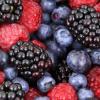Thank you Michael. Couple of comments:
- I caution about interpreting longitudinal individual vs cross section population data. E.g. from my data I am at ~4.8 at 65 from fit over ~25 years (average 4.97) vs ~4.3 in Wang 2017, basically having at 65 the same value as at 20 in the paper.
- There is large dispersion in both your and my data set.
- Why yogurt, mechanistically?
- There should be a cross sectional study between RBC and dairy intake to well determine correlations
- Did not check plasma osmolarity as that is new to me, intriguing. I can do it as I have the row data.
Using data from large epidemiological studies, I almost always introduce age-related changes for each biomarker in the videos to get a sense for what happens during aging. Where it exists, I also try to introduce data for risk of death for all causes, and together, one can have a sense for what portion of the reference range is optimal. From those data, higher RBCs are found in youth, but in contrast, lower levels, as found in anemia, are associated with an increased all-cause mortality risk.
In terms of your data being similar to mine, it doesn't have to be, we can all respond differently to different stimuli (diet, exercise, supplements, etc), thereby resulting in different levels of outcome variables. That said, your 4.8 value at 65y , and your 25y average is great!
In terms of of yogurt's mechanism, as I mentioned in the video, the best guess is Lactobacillus. I had 3 gut microbiome tests that revealed 0 Lactobacillus during the time that I didn't consume any yogurt, and I'm betting that daily yogurt intake corrected that deficiency. However, I haven't tested my microbiome since that to confirm this hypothesis. Correcting microbiome-related deficiencies of particular species can impact systemic physiology-for ex., in this paper, rescue of Lactobacillus deficiency in this mouse model increased muscle mass (https://www.ncbi.nlm...les/PMC4914249/). More specifically, there's data that Lactobacillus can increase testosterone, which increases hematocrit, but I don't have testosterone data to confirm that, either. I usually don't make such great leaps with my hypotheses, which is why I mentioned in the video that if anyone had a potential alternative mechanism, to leave a comment!
I agree that there should be cross-sectional studies for the correlation for yogurt with RBCs, however, a PubMed search only yields 2 papers (https://pubmed.ncbi....t=date&size=200), neither of which reported that correlation.





















































